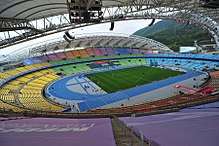Daegu Stadium
Daegu Stadium,[1] also known as the Blue Arc, is a sports stadium located in Daegu, South Korea. It was formerly named Daegu World Cup Stadium but was changed to Daegu Stadium on 5 March 2008. It has a seating capacity for 66,422 people, and parking for 3,550 cars. It is located approximately 11 kilometers or 20 minutes by car from Daegu Airport. It is managed by the Daegu Sports Facilities Management Center.
Blue Arc | |
 | |

| |
| Full name | Daegu Stadium |
|---|---|
| Former names | Daegu World Cup Stadium |
| Location | 504, Daeheung-dong, Suseong-gu, Daegu, South Korea |
| Coordinates | 35°49′47.2″N 128°41′25.1″E |
| Owner | Daegu Metropolitan City |
| Operator | Daegu Sports Facilities Management Center |
| Capacity | 66,422 |
| Field size | 105 x 68 m (running track: 400 m x 8 lane, 100 m x 9 lane) |
| Surface | Grass, Tartan track |
| Construction | |
| Broke ground | 29 July 1997 |
| Opened | 28 June 2001 |
| Construction cost | US$265 million |
| Architect | Kang Cheol-Hee, Idea Image Institute of Architects (IIIA) |
| Structural engineer | Substructure: Seoul Structure, Roof: WS Atkins |
| General contractor | Samsung |
| Tenants | |
| Daegu FC (2003–2018) | |
| Daegu Stadium | |
| Hangul | 대구스타디움 |
|---|---|
| Hanja | 大邱스타디움 |
| Revised Romanization | Daegu Woldeukeop Gyeoggijang |
| McCune–Reischauer | Taegu Wŏldŭkŏp Kyŏnggijang |
It was one of the host venues of the 2002 FIFA World Cup and the main stadium for the 2003 Summer Universiade[2] and the 2011 World Championships in Athletics. It was the home stadium of Daegu FC until 2018.[3][4]
Construction
The construction was completed in May 2001 at a cost of 265,000,000 USD. The roof was engineered by the international consultancy WS Atkins. The roof is in two sections, each with an inclined trussed steel arch spanning 273 m for a rise of only 28.7 m, and propped by 13 secondary arches off a perimeter second "arch" that is supported by raking columns.[5] The total roof steel weight is 4,350 t. The roof cladding is a PTFE-coated glass-reinforced fabric canopy. The modelling (form-finding) and analysis of the tensile roof was performed by Tensys.[6] Wind tunnel studies were carried out by BMT Limited to assess the wind loading on the roof.
2002 FIFA World Cup
The stadium was the largest stadium in South Korea during the 2002 FIFA World Cup. It held the following matches:
| Date | Team 1 | Result | Team 2 | Round |
|---|---|---|---|---|
| 6 June 2002 | 1–1 | Group A | ||
| 8 June 2002 | 0–1 | Group B | ||
| 10 June 2002 | 1–1 | Group D | ||
| 29 June 2002 | 2–3 | Third place match |
Events
Daegu Marathon
Daegu World Cup Stadium hosts the Daegu Marathon annually in April of each year.
Concerts
The stadium was also the venue for the 8th Asia Song Festival, organised by Korea Foundation for International Culture Exchange, in 2011.[7]
See also
References
- World Stadiums Daegu Stadium Archived 2009-01-27 at the Wayback Machine Retrieved 2011-10-12
- 22nd SUMMER UNIVERSIADE Archived 2011-08-14 at the Wayback Machine Retrieved 2011-10-12
- (in Korean) K-League 대구 월드컵 경기장, 시민들을 위한 따뜻한 쉼터 – Dream stadium of K-League
- (in Korean) Daegu FC official homepage Retrieved 2011-10-12
- New Civil Engineer Korea Ready for Kickoff Retrieved 2009-10-20
- Architectural RecordBuilding Types Study: Stadiums: Daegu Stadium Retrieved 2009-10-20
- The Chosun Ilbo Asian Singers to Gather in Daegu for Asia's Biggest Pop Concert 10 October 2011. Retrieved 2011-10-12
External links
- Daegu Sports Facilities Management Center (in Korean)
| Events and tenants | ||
|---|---|---|
| Preceded by Olympiastadion Berlin |
IAAF World Championships in Athletics Venue 2011 |
Succeeded by Luzhniki Stadium Moscow |
| Preceded by Workers Stadium Beijing |
Summer Universiade Opening and Closing Ceremonies 2003 |
Succeeded by İzmir Atatürk Stadium İzmir |